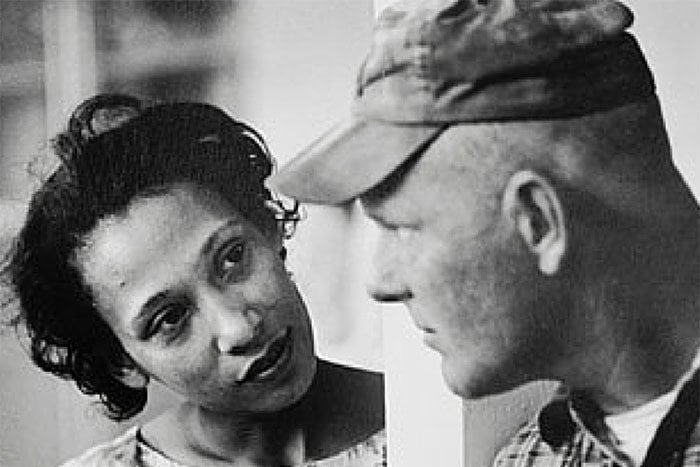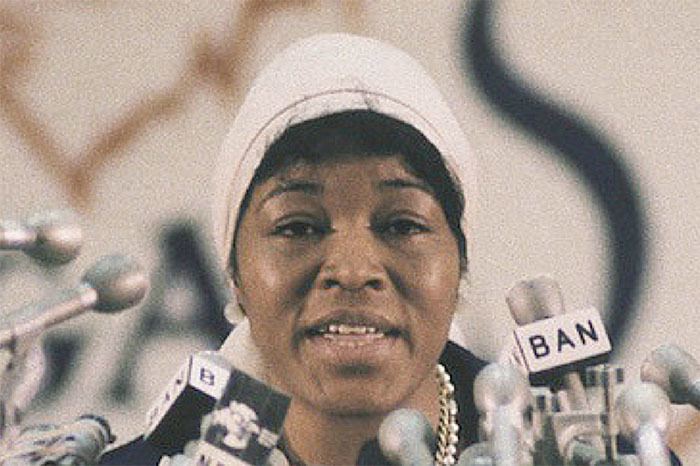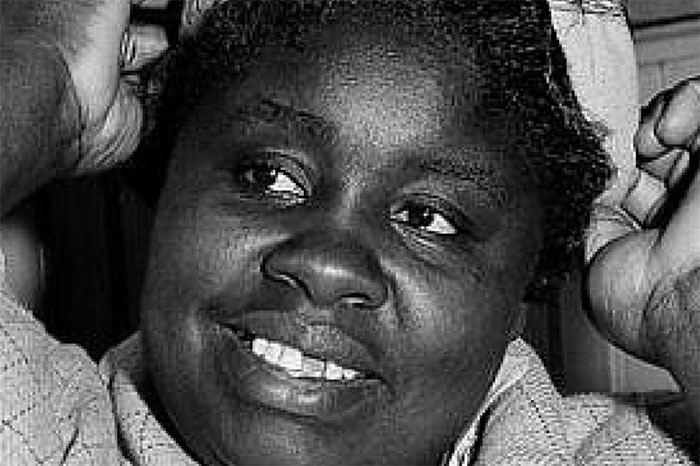Most people know who Rosa Parks is — here are four other women in the Civil Rights Movement whose names you should know.

Express Newspapers/L360/Getty ImagesYoung women at the March on Washington for Jobs and Freedom, Washington DC, August 28, 1963.
Many forget that when Rosa Parks famously refused to give up her seat in a Montgomery, Alabama bus, this was not the first time she had done so. People likewise forget that she was not the first African-American woman to stand her ground in a public transportation setting — and that Parks was but one star among a constellation of African-American women who helped lead the movement for equality and the end of segregation in the 1950s, 1960s and beyond.
Indeed, several of her contemporaries were, like Parks, working women whose advocacy and activism were simply part of their day-to-day lives. This, in a way, makes them and their achievements all the more extraordinary.
Four of these female civil rights leaders are profiled here, to celebrate not just Parks’ legacy, but the collective courage of the women of her generation:
Female Civil Rights Leaders: Mildred Loving

Mildred Loving and her husband Richard. Image Source: Huffington Post
Perhaps her surname was destiny. Mildred Loving, née Jeter, never set out to be a civil rights heroine, but when she fell in love with a white man in Virginia during the 1950s, she found herself at the center of a national scandal. At the time, interracial marriage was illegal. The Racial Integrity Act prohibited such marriages, and after she and Richard wed they were forced to leave the state.
In fact, Mildred was African-American and Native-American, and often referred to herself racially as Indian rather than black. She met her future husband when he was a senior in high school; she was eleven. The couple decided to marry when she was eighteen and pregnant, but had to drive to Washington D.C. to complete their nuptials in 1958.
They had only returned home to Virginia for several weeks before an “anonymous source” tipped off the local police that they were illegally wed. According to Loving, the sheriff came to arrest the couple while they were still in bed. Mildred was pregnant and spent several nights in jail after the joint arrest.
The couple was released on the condition that they leave the state and not return for at least 25 years. The duo obliged, and made separate trips back home over the years to visit the family they had left behind. By 1963, the Lovings decided they weren’t going to take it any more and reached out to civil rights leaders for help. Mildred wrote to Attorney General Robert Kennedy, who suggested they get in touch with the ACLU, which he believed would champion their case.
The Lovings’ case went to the Supreme Court of Appeals in Virginia, where it was argued that the law keeping the Lovings from living as a married couple were not equally discriminatory and therefore should be struck down. Richard Loving’s testimony was heartbreakingly simple: “Tell the court I love my wife, and it is just unfair that I can’t live with her in Virginia.”
The high court unanimously voted in favor of the Lovings and they returned home. What the Lovings had won for themselves stretched far beyond their marriage, with Chief Justice Earl Warren stating that prohibiting marriage solely on the basis of race went against the 14th amendment.
Richard and Mildred Loving remained married and lived with their family in Virginia until 1975, when a drunk driver struck the couple, causing Richard’s death. Mildred survived but lost vision in her right eye as a result of the accident. She died of pneumonia in 2008.
Septima Poinsette Clark

Septima Clark spent much of her life fighting for equal education. Image Source: Wikipedia
Born in Charleston, South Carolina in 1898, Septima Clark was certain from a young age that she wanted an education. While she was able to attend Avery Normal Institute and earn her teaching certificate, she was not able to find a teaching job when she set out in 1916: Charleston did not hire African-Americans to teach in its public schools. She returned to Avery and was granted a teaching job there in 1919, the same year she joined the NAACP, hoping to lead the charge for city schools to begin hiring black educators.
For the next decade she continued to teach and work with the NAACP, but five years into her marriage to Nerie Clark, her husband died of kidney failure. Widowed and childless (her first child had died at birth) she devoted herself fully to the efforts of the NAACP, working alongside Thurgood Marshall on a landmark case that scored equal pay for black and white teachers (her salary increased three-fold after the case was won).
Clark continued to teach while actively working with the NAACP until 1956, when Charleston made it illegal for public employees (including teachers) to belong to civil rights groups. Torn between her two callings, but certain that the work of the NAACP was far from done, she refused to leave the group. She was, therefore, fired.
After leaving Charleston, she continued to teach in Tennessee (where her efforts with the NAACP were encouraged) and was director of a program that helped community members learn to identify and teach those with low or no literacy skills. In the early 1960s, this was paramount to the right to vote, as many city governments required African-Americans to take next-to-impossible literacy tests in order to vote.
Clark retired in 1970, and died on John’s Island off Charleston in 1987 at the age of 89.
Betty Shabazz

Betty Shabazz speaks to the press.
Though she was married to one of the most prolific of activists, Malcolm X, Betty Shabazz — better known to many as Betty X — was an activist of note in her own right, in no small part because of how she carried on the legacy of her husband after his assassination.
Much about Betty’s early life is unknown, but at least some of her youth was spent in the care of civil rights activist Helen Malloy, who may have set her on a path of activism. She attended school at the Tuskegee Institute in Alabama, where she was appalled by the racism she encountered. Soon after, Betty went to Brooklyn to study nursing, where the racism was present but less overt than in the Jim Crow South.
While in nursing school Betty became acquainted with several members of a nearby Nation of Islam temple. It was here that she met a charismatic man by the name of Malcolm X. After attending several of his services, she converted, changing her name to Betty X (the dropping of her surname indicating the loss of her African ancestry). Betty married Malcolm several years later and the couple had six daughters before leaving the Nation of Islam in 1964, at which time the family became Sunni Muslims.
Throughout her career in health sciences as a nurse and educator, Betty fought the civil rights battle in a field that was not, perhaps, as much of a focus as areas like education and public policy.
But in hospitals at the time, it was not uncommon for white patients to be abusive toward black nurses or straight-up refuse to be treated by them. Black nurses were often given lesser or, at times, demeaning assignments by white nurse supervisors and doctors. This more subtle, but still infuriating, racism is something Betty encountered in the workforce throughout her career.
The following year, Malcolm X was assassinated. Betty never remarried and raised their six daughters alone, working predominantly as a college administrator, and occasionally giving talks on civil rights and tolerance. She died in 1997 after her grandson, Malcolm, set fire to the apartment building they lived in.
Georgia Gilmore

Georgia Gilmore utilized her kitchen prowess to help organize for civil rights. Image Source: Biography
After Rosa Parks refused to give up her seat on the bus, citywide bus boycotts sprang up around the nation — and one woman led them with gusto. Her name was Georgia Gilmore.
Martin Luther King Jr. primarily organized the nationwide boycotts, but at the local level, it took the courage and leadership of a few civil rights activists to see the plan come to fruition. Georgia was among those who led the charge in Montgomery, Alabama, where she worked as a cook.
Eventually, Gilmore’s involvement in civil rights organizing led to her firing. It was then that King suggested she start a restaurant out of her own home.
Initially, her home was a haven for civil rights activists, who could share a warm meal somewhere that was safe and private — but soon, Georgia founded the Club from Nowhere and invited other women to come cook with her, supplying pies and cakes not just to the activists, but customers from the community — of all races. All of the proceeds went to the boycotts.
Gilmore died in 1990, and her home was memorialized as a historical site. Wrote NPR’s Kitchen Sisters upon visiting the Club from Nowhere:
“I came to talk to folks about Ms. Gilmore’s cooking, but I was told repeatedly that, like most people, she was also struggling to raise her children, make a living and support her community. But it is her cooking which remains a touchstone for people in Montgomery when they think of ‘the movement.’ She elevated her day-to-day work — doing the cooking — into something greater. Anyone lucky enough to have eaten one of her meals associates it with that place and what that time demanded.”
If you enjoyed this, be sure to check out the story of Dion Diamond, a civil rights warrior in the suburbs, as well as these surprising facts about Martin Luther King, Jr.





